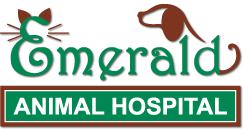Like humans, dogs and cats can get eye troubles. These issues can be a result of trauma, genetic diseases, or environmental exposure. Here’s a few common eye conditions seen in cats and dogs and how you can help keep your pet’s eye health in tip top shape!
Common Eye Conditions In Cats
- Conjunctivitis: Inflammation of conjunctiva. This is often called “pink-eye” as it makes the eye red and inflamed.
- Cornea Ulcers: An open sore on the cornea that has a wide variety of causes.
- Keratitis: Inflammation of the cornea, usually caused by an infection.
- Corneal Sequestra: This happens when a section of the corneal tissue dies.
- Glaucoma: Occurs when the optic nerve (which connects the eye to the brain) is damaged. Can be caused by many things, but is often due to high eye pressure.
- Cataracts: Usually rare and only seen in senior cats, this is a result of cloudiness in the eye.
Common Eye Conditions In Dogs
- Conjunctivitis: Inflammation of conjunctiva. This is often called “pink-eye” as it makes the eye red and inflamed.
- Dry eye
- Abnormal Eyelids (Entropion): A genetic disorder that results in an eyelid being folded inward, resulting in eyelashes scratching and damaging the eye.
- Eyelash Disorders: Ingrown eyelashes, eyelashes growing in improper areas of the eyelid, and eyelashes that grow through the eyelid are all at risk to damage the eye.
- Corneal ulcerations: An open sore on the cornea that has a wide variety of causes.
- Glaucoma: Occurs when the optic nerve (which connects the eye to the brain) is damaged. Can be caused by many things, but is often due to high eye pressure.
- Cataracts: Usually rare and only seen in senior cats, this is a result of cloudiness in the eye.
- Cherry eye: This condition is a result of the dog’s third eyelid (which protects the tear duct) is not properly held in place by eye ligaments and pops up into the visible portion of the eye. This typically occurs in young dogs but, on very rare occasions, can also be present in cats.
Common Eye Condition Symptoms
In both cats and dogs, keep an eye out for these symptoms (pun intended).
- Excessive drainage from the eyes
- Rubbing of eyes
- Increased redness of the eyes
- Swelling around the eyes
- Squinting
- Difference in pupil sizes
- Cloudy/Opaque eyes
- Visible third eyelid
- Evidence of vision decline (bumping into furniture, unable to find the toy that’s close by, etc.)
How YOU can help keep your pet’s eyes healthy:
- Look into your pet’s breed for any predispositions to eye conditions. Some breeds are prone to cherry eye (like Great Danes) while others are more likely to be cross-eyed (Siamese cats).
- For long haired pets, be sure to keep their facial hair trimmed to keep their eyes clear of fur.
- Avoid using products like shampoos, perfumes, and more near your pet’s eyes. Rinse their faces thoroughly after using any of these kinds of products on their facial area.
- Gently wipe discharge from your pet’s eyes using a clean, damp cotton ball and use a different cotton ball for each eye (in case there’s an infection, you don’t want to spread the infection from one eye to the other).
- Make sure your pet is exposed to natural light (from the sun) through windows or while outside.
- If your pet spends a significant amount of time outdoors, make sure he or she has access to shade, as bright light for a long time can strain their eyes.
- Don’t let your dogs stick their heads out of the window while you’re driving. While this may be fun for them and a great photo opportunity, The wind can dry out their eyes and debris can get stuck in their eyes, causing permanent damage and irritation.
- Check on your pet’s diet to make sure they’re getting the proper nutrients to support eye health. Adding foods like blueberries, carrots, sweet potatoes, and salmon to your pet’s diet can help keep their eyes happy and healthy.
Here at Emerald Animal Hospital, your pet’s health is our top priority. We are ready to work with you and your pet to develop a personalized plan to keep your pet in his or her best health. Give us a call at 216-688-3737 to set up an appointment so we can answer all your questions!

